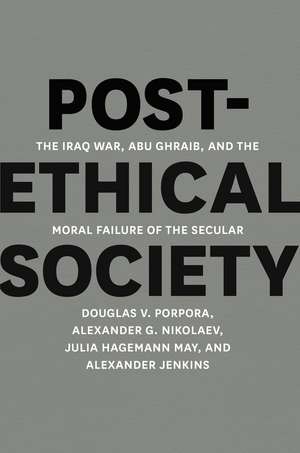Post-Ethical Society: The Iraq War, Abu Ghraib, and the Moral Failure of the Secular
Autor Douglas V. Porpora, Alexander G. Nikolaev, Julia Hagemann May, Alexander Jenkinsen Limba Engleză Hardback – 17 oct 2013
We’ve all seen the images from Abu Ghraib: stress positions, US soldiers kneeling on the heads of prisoners, and dehumanizing pyramids formed from black-hooded bodies. We have watched officials elected to our highest offices defend enhanced interrogation in terms of efficacy and justify drone strikes in terms of retribution and deterrence. But the mainstream secular media rarely addresses the morality of these choices, leaving us to ask individually: Is this right?
In this singular examination of the American discourse over war and torture, Douglas V. Porpora, Alexander Nikolaev, Julia Hagemann May, and Alexander Jenkins investigate the opinion pages of American newspapers, television commentary, and online discussion groups to offer the first empirical study of the national conversation about the 2003 invasion of Iraq and the revelations of prisoner abuse at Abu Ghraib a year later. Post-Ethical Society is not just another shot fired in the ongoing culture war between conservatives and liberals, but a pensive and ethically engaged reflection of America’s feelings about itself and our actions as a nation. And while many writers and commentators have opined about our moral place in the world, the vast amount of empirical data amassed in Post-Ethical Society sets it apart—and makes its findings that much more damning.
In this singular examination of the American discourse over war and torture, Douglas V. Porpora, Alexander Nikolaev, Julia Hagemann May, and Alexander Jenkins investigate the opinion pages of American newspapers, television commentary, and online discussion groups to offer the first empirical study of the national conversation about the 2003 invasion of Iraq and the revelations of prisoner abuse at Abu Ghraib a year later. Post-Ethical Society is not just another shot fired in the ongoing culture war between conservatives and liberals, but a pensive and ethically engaged reflection of America’s feelings about itself and our actions as a nation. And while many writers and commentators have opined about our moral place in the world, the vast amount of empirical data amassed in Post-Ethical Society sets it apart—and makes its findings that much more damning.
Preț: 281.99 lei
Preț vechi: 327.33 lei
-14% Nou
Puncte Express: 423
Preț estimativ în valută:
53.96€ • 56.48$ • 44.91£
53.96€ • 56.48$ • 44.91£
Carte indisponibilă temporar
Doresc să fiu notificat când acest titlu va fi disponibil:
Se trimite...
Preluare comenzi: 021 569.72.76
Specificații
ISBN-13: 9780226062495
ISBN-10: 022606249X
Pagini: 264
Ilustrații: 20 tables
Dimensiuni: 152 x 229 x 28 mm
Greutate: 0.53 kg
Ediția:New.
Editura: University of Chicago Press
Colecția University of Chicago Press
ISBN-10: 022606249X
Pagini: 264
Ilustrații: 20 tables
Dimensiuni: 152 x 229 x 28 mm
Greutate: 0.53 kg
Ediția:New.
Editura: University of Chicago Press
Colecția University of Chicago Press
Notă biografică
Douglas Porpora is professor of sociology in the Department of Culture and Communication at Drexel University. His books include How Holocausts Happen: The U.S. in Central America and Landscapes of the Soul: The Loss of Moral Meaning in American Life. Alexander G. Nikolaev is associate professor of communication at Drexel University. He is the author of International Negotiations: Theory, Practice, and the Connection with Domestic Politics and coeditor of Leading to the 2003 Iraq War: The Global Media Debate and Ethical Issues in International Communication. Julia Hagemann May and Alexander Jenkins are doctoral candidates at Drexel University. They all live in Philadelphia.
Cuprins
Acknowledgments
Introduction: Do We Need Religion?
1 Prudential and Moral Argumentation about the Iraq War
2 Setting the Context: President Bush’s Prewar Rhetoric on Iraq
3 The Multiply Muted Opposition of the Press
4 Abu Ghraib and Torture: Whither Dostoyevsky?
5 How Television Debated the Attack on Iraq
6 The Online Debate about Iraq and Abu Ghraib
7 Congress: Gone Fishing
Conclusion
NotesIntroduction: Do We Need Religion?
1 Prudential and Moral Argumentation about the Iraq War
2 Setting the Context: President Bush’s Prewar Rhetoric on Iraq
3 The Multiply Muted Opposition of the Press
4 Abu Ghraib and Torture: Whither Dostoyevsky?
5 How Television Debated the Attack on Iraq
6 The Online Debate about Iraq and Abu Ghraib
7 Congress: Gone Fishing
Conclusion
Bibliography
Index
Recenzii
“A compelling argument that utilitarian concerns have largely replaced ethical imperatives in public policy discourse. . . . Essential.”
